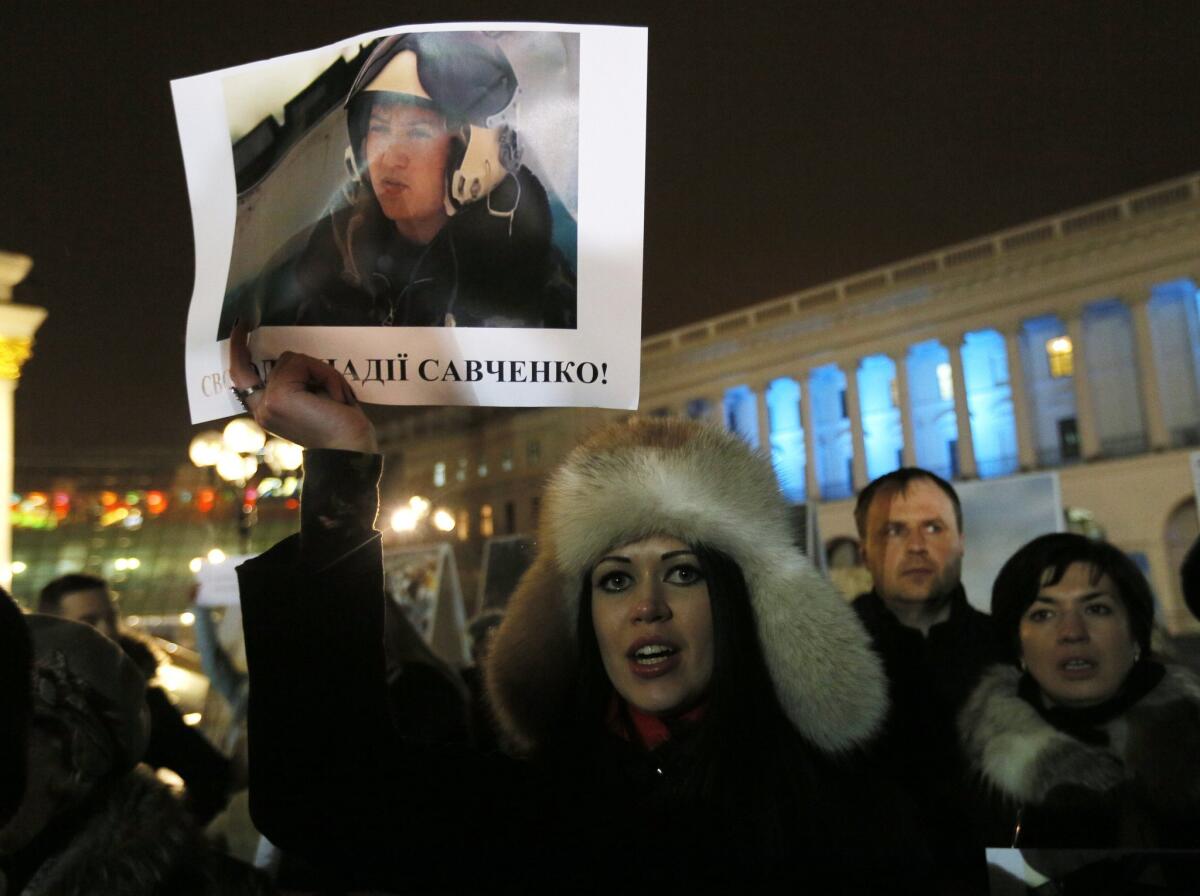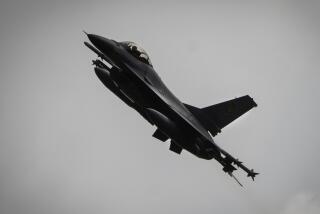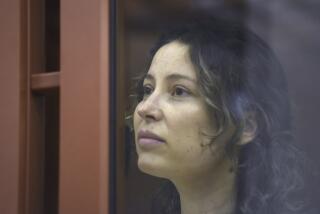Captured Ukrainian army officer on hunger strike in Russia

Reporting from Moscow â A Ukrainian army officer held by Russian authorities was transferred from a prison to a hospital Thursday after losing more than 60 pounds during a hunger strike to challenge her arrest, her lawyer said.
Nadezhda Savchenko, who is also a Ukrainian lawmaker, has been held since June, accused of complicity in the death of two Russian journalists covering fighting between separatists and government forces in eastern Ukraine.
Russian investigators say Savchenko coordinated the mortar fire that killed the journalists on June 17, a charge her lawyers dispute. Her presence in Russia has been a source of intense debate over whether she arrived willingly or was kidnapped.
Savchenko, 33, says she was taken prisoner in the Luhansk region of eastern Ukraine, one of two regions where Ukrainian forces are battling separatist fighters they say are backed by Russia, and handed over to Moscow.
Her Russian lawyer, Nikolai Polozov, said his client was helping to evacuate injured troops on June 17 and had nothing to do with the deaths of the reporters.
âShe brought back from the battlefield four wounded comrades and went back to get the fifth when she was taken by enemies,â Polozov told the Los Angeles Times. âThen a total judicial theater of the absurd began when she was smuggled into Russia, said to have illegally crossed into Russia, and then accused of helping to murder the journalists back in Ukraine.â
Alexander Drymanov, a senior Russian investigator, told the Kommersant newspaper in July that she crossed the border in a taxi with another man and was arrested in Russia. âHer purpose for visiting our country is yet to be determined,â he said at the time.
Drymanov said calls on Savchenkoâs cellphone bill prove her guilt, a claim disputed by her lawyer.
âWe have an iron-clad alibi for Nadezhda ... based on the bills for her cellphone and the cellphones of the killed reporters,â Polozov said. âAccording to our comparison of the bills, Nadezhda was captured by separatists an hour before the Russian journalists died in a bombardment.â
âBesides,â he added, âRussian investigators themselves assert that it was a mortar bombardment, when the Ukrainian army didnât have mortar batteries anywhere near the place. So the reporters may have fallen victim to so-called friendly fire.â
Savchenkoâs sister, Vera, visited her at a Moscow prison on Jan. 20. She told The Times that Savchenko was brought into Russia by gunmen âwith a hood over her head.â
âMoscow wanted to break Nadya and organize a Stalinist-type show trial in Moscow to back up their theory that the Ukrainian military commits atrocities and all kinds of crimes against humanity, and in short eats little children alive,â said Vera Savchenko, using a nickname for her sister.
âBut they found the wrong person for their plan, and Nadezhda responded with a hunger strike, which she is not inclined to stop until she is released and sent back home.â
In December, Ukraineâs parliament named Savchenko as one of its delegates to the Parliamentary Assembly of the Council of Europe, a Strasbourg-based body tasked with upholding human rights, democracy and rule of law across the continent.
The assembly said Wednesday that her status as a delegate entitled her to immunity from prosecution and demanded that she be released within 24 hours. Instead, Russiaâs Federal Security Service on Thursday charged Savchenko with an illegal border crossing and opened a criminal case against her, the Tass news agency reported.
The assembly suspended Russiaâs voting rights last year in protest against Moscowâs annexation of Ukraineâs Crimea region. The ban was renewed Wednesday, prompting Russiaâs delegation to resume its boycott of the assembly.
Special correspondent Victoria Butenko contributed to this report from Kiev, Ukraine.
More to Read
Sign up for Essential California
The most important California stories and recommendations in your inbox every morning.
You may occasionally receive promotional content from the Los Angeles Times.










